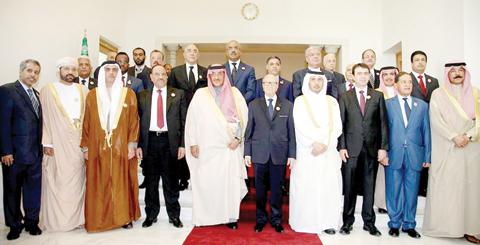TUNIS: Kuwait's Interior Minister affirmed yesterday that combating terrorism and drying up its sources constitute the greatest challenge facing Arab security apparatuses. Addressing the 33rd session of the Arab Interior Council, Sheikh Mohammad Al-Khaled Al-Hamad Al-Sabah, also the Deputy Premier, said hard circumstances prevailing in a number of Arab states led to insecurity and instability. "It is our duty to sense these circumstances and we should seek maximum cooperation and coordination" to deal with these challenges, he said.
Sheikh Mohammad Al-Khaled sounded the alarm bell due to the terrorist incidents, warning that no country "would be immune from the terrorist operations." He called for serious action to cutt off "arteries of terrorism and drying up financing resources and protecting our sons from its perils."
"Intellectual security is the mightiest arm in facing and conquering terrorism," he said, praising in particular role at this level by the Saudi Naif University for Security Sciences. Tremendous development in the social media means rendered the electronic realms a fertile entity for terrorist organizations, threatening the intellectual security by large, and this warrants unification of efforts and activation of pacts for combating cybercrimes and establishing bridges of cooperation with the operating companies for sake of preserving peoples' security, the Kuwaiti Interior Minister stated at the Arab conference.
Extraordinary security conditions in the Arab world have resulted in arms proliferation, in addition to drugs' spread, he said, warning against an approach to amend some anti-narcotics international conventions, including the notion to cancel execution and allowing deals in some drugs.
Such ideas are expected to be put forward at the 59th session of the UN Commission on Narcotic Drugs due in Vienna next month and the extraordinary UN General Assembly session for discussing drugs in April, Sheikh Mohammad Al-Khaled added. Arab states should unify their stances and take a joint attitude to "abort this scheme and confront notions that compromise our basic principles and doctrine," he said.
Broad strategy
Arab interior ministers agreed to enhance cooperation and information exchange, as part of a broad strategy to stifle terrorism. Speaking at the session, Crown Prince, First Deputy Prime Minister and the Minister of Interior of Saudi Arabia Muhammad bin Nayef bin Abdulaziz Al Saud underscored the need to boost cooperation amongst Arab security apparatuses, saying that "combating crime is a joint obligation."
The Arab world faces growing challenges that threaten peace and security, "which calls for increased efforts to generate awareness on the need to uphold peace in society," Prince Mohammad said. Moreover, Arab League Secretary General Nabil Al-Araby underlined the fact that the session takes place amidst trying times, saying that cooperation is necessary to wipe out terrorism.
Araby also said that eradicating terrorism is the Arab world's biggest challenge, calling for plans to hold similar meetings of Arab defense, justice and foreign ministers in attempt to consolidate efforts against terrorism.
Secretary General of the Arab Interior Minister Council Dr Mohammad bin Ali Koman pointed to "the atrocities committed by terrorist groups in Yemen and Syria. Koman also said that the Arab Interior Minister Council encapsulates Arab cooperation, and is evident of successful, joint Arab work.
Security cooperation
Tunisian President Beji Caid Essebsi had called on Arab nations to ramp up security cooperation to combat terrorism, "which has sparked disarray and threatened peace." Speaking at the session, Essebsi said that the Arab region is faced with perilous challenges, "as sectarian tensions and internal strife is plaguing the region." He also singled out the so-called Islamic State (IS) as "a major threat to Arab security, by virtue of the group's ability to attract sympathizers."
Moreover, Essebsi warned that Arab nations are on the cusp of collapse, in light of rampant conflict that pervades the region. "The fight against terrorism necessities a united front to uphold security and peace in the Arab world," he noted.
On security conditions in his country, Essebsi said that Tunisia is facing an unprecedented level of danger that threatens security in the country. "Deterioration of security in Libya is detrimental to security in Tunis, as Tunisia is most vulnerable to the ill effects of the conflict in Tripoli," the Tunisian President said. "These obstacles behoove us to constantly reshape our strategies of fighting terrorism," he said."
Earlier yesterday, the 33rd session of the Arab Interior Minister Council kicked off, with participation of Arab interior ministers, security delegations and representatives of the United Nations (UN), Arab League (AL) and the Gulf Cooperation Council (GCC). - KUNA



